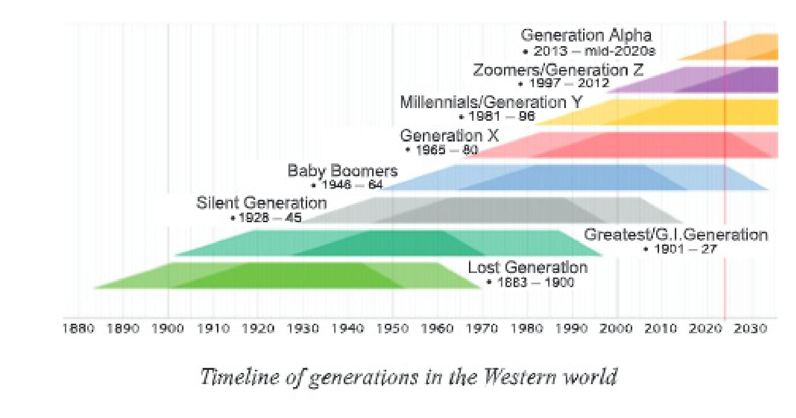Learning outcomes:
After we have studied this unit, we will be able to
Listen to the song 'Kotha Ko' by Shezan on internet.
Have you heard the song 'Kotha Ko' by Shezan? While singers from earlier generations were often too afraid to use music as a form of protest, artists like Shezan and Hannan have courageously spoken out. Their rap songs became anthems of the July Uprising in 2024. The new generation is no longer afraid; they are brave and different. But how do we make sense of the difference? What defines different generations? And what are the connections that link them across time?
Although generational labels are rooted in Western ideas and may not universally apply, they can sometimes offer a useful framework for understanding changing social dynamics. The idea of naming generations started in the early 20th century with the 'Lost Generation'. This referred to those who suffered the aftermath of World War I and the Great Depression.

The naming practice continued with Generation X and then Millennials, eventually reaching Generation Z. Generation Z is a group that grew up entirely in the digital age the first to zoom into the internet.

Growing up with social media, a mobile internet, and a lot of information, Gen Z experiences a paradox: hyperconnected yet often isolated, digitally adept but frequently anxious, free yet persistently stressed. They have also witnessed transformative global events climate crises, political turmoils like the Ukraine-Russia war and the genocide in Palestine that shape the world they are supposed to inherit.

In Bangladesh, the struggle for progress has long been a part of each generation. If the freedom fighters of 1971-largely part of the Baby Boomer generation helped liberate the country, their struggle laid the groundwork for the 1980s' fight for democracy against autocracy.

Today's young generation, born around 2000, carries this legacy forward. The 2018 road safety protests and the brutal crackdown that followed marked a significant shift in Gen Z's consciousness, sharpening their political awareness and reshaping the role of media in their world.

Consequently, the 2024 uprising was led by this generation, who realized the ineffectiveness of political establishments and grew increasingly frustrated with the status quo.
The July Uprising of 2024 signals an urgent call for adaptation. Outdated methods can no longer meet the challenges of today's world. To truly support Gen Z's ambitions, we need concrete steps, as political rhetoric has failed them. Only with this commitment can the vision and energy of this generation be given the support they deserve.

A. Answer the following questions based on your reading of the passage.
Match the words with their correct definitions:
| Given Word | Corret Definition |
| a. A paradoxical situation where two opposite conditions exist simultaneously. |
| b. The use of language to persuade or influence, often in a manipulative way. |
| c. A system of government where power is held by one person with absolute authority. |
| d. Awareness or understanding of something, especially the state of one's mind. |
| e. The feeling of being upset or annoyed, especially because of an inability to change or achieve something. |
C. Fill in the Gaps
Fill in the blanks using the words from the list below:
(Lost Generation, Gen Z, political, digital, connected)
common.read_more